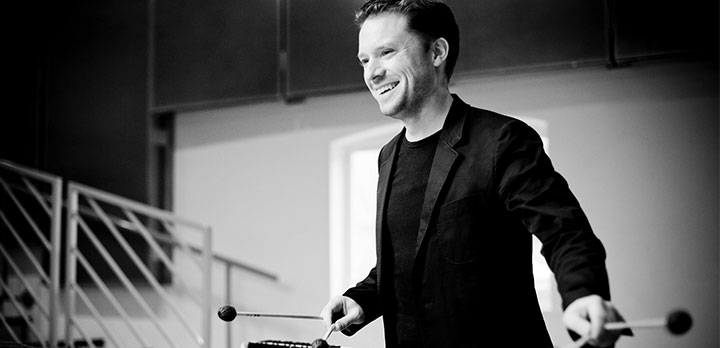Spotlight on Colin Currie

by Kayla Moore
Colin Currie returns to the Music Hall stage April 12–13 for performances with the CSO of Sieidi, music written for him by composer Kalevi Aho. He recently shared insights about the music, his creative process, and what it takes to be a world-class musician:
As a Master Percussionist traveling internationally, what do you consider the most challenging, and most rewarding, aspects of working with different orchestras?
Collaborating with orchestras and orchestral musicians is a very precious privilege for me, and I relish the interaction that playing a concerto presents. All orchestras have a different weighting, and react in their own way to the overall sense of timing emitting from the conductor and soloist. This is a fascinating part of integrating with different groups around the globe, and finding that balance, as well as finding that crucial blend in the sound between me and the orchestra, are my principal objectives.
When preparing for a performance, both physically and artistically, what thoughts occupy your mind as you begin the creative process?
I’m very interested in the concept of “authenticity” in music and making each work as true as possible to the composers’ core identities. Bringing their ideas and concepts to clarity is essential, so I spend a lot of time considering the options to make each concerto speak truthfully and clearly. We often hear that, with new music, the audience is usually hearing the work for the first time, but I am also aware that it could be the first and last time…so it’s crucial to make the right impression.
When you interpret a work such as Sieidi, which was written for you by Kalevi Aho, how do you emphasize certain musical elements and incorporate your style without compromising the integrity of the piece?
With the works written especially for me, the composers know my playing and the kind of qualities that I am able to lend. In the best of them, like Kalevi’s Sieidi, he was well aware of the potential for drama, intricacy, emotional intensity and the idea of presenting an ambitious structure. These are all elements that appeal to me very naturally, and I feel I can support them strongly over the course of a concerto. The balance of Kalevi/Colin is an interesting question. I suppose there has to be enough of each for the other to prosper!
Spectator refers to you as “the world’s finest and most daring percussionist.” Can you share some thoughts about what key traits/skills or instincts an artist should embody if he or she is serious about becoming a world-class musician? In other words, what do you believe contributes to the “It Factor” that serves to immortalize some musicians?
There is no great secret here. You need utter dedication to the art form, an extraordinary amount of patience for long hours of agonizing practice, and to feel a natural passion that people can pick up on. Any artist who attempts to falsify such things is doomed, as audiences instinctively know when they are hearing something genuine—or not. There are instances of pure natural talent sustaining amazing musicians, but this is, believe me, exceedingly rare. 10,000 hours? Try 20,000.
Looking ahead, what new projects are in the works for you and the ensemble, Colin Currie Group?
Forming this group has been one of the most exciting projects of my career. The ensemble is dedicated to the music of Steve Reich, and we are honored to have him travel with us, perform with us and also, wonderfully, write new music for us. We continue to tour his music internationally, and we look forward to our U.S. debut soon, which will mean a lot to us—to bring his music back home will be a special moment.